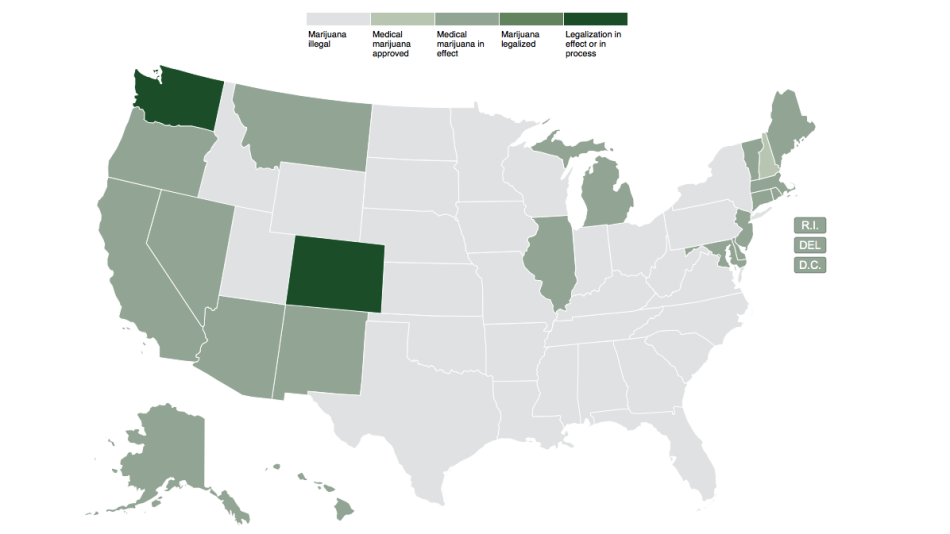Drug Effects: The Consequences of Making Marijuana Legal
May 6, 2014
In 2014, the Seattle Seahawks brutally beat the Denver Broncos in the Super Bowl. But some people in the nation were less focused on the techniques in the football and more on dealing with a recent turn of events. Both these states, Washington and Colorado, had just legalized marijuana.
As teenagers we have heard of marijuana, weed, Mary Jane, Aunt Mary, pot, grass, skunk, or the literally hundreds of other slang words that exist for the drug. But we have also been taught time and time again not to do it. So why is it legal?
As radical as it may sound, legal marijuana is not a new concept to America. Twenty states, including Illinois, permit marijuana for medical use. Often the drug is used in end of life cases where comfort of the patient is a key issue. The difference with Washington and Colorado is that now marijuana can be used for recreational pursuits. That is, just for the simple “enjoyment” of the individual.
The argument for legalization states a highly regulated marijuana market would lessen many problems in America today. It would not only help fight drugs on the street, but also provide a much safer product since “weed” on the street has become increasingly stronger since the 1970s. A market controlled by the government would take away, or at least reduce the need for smuggling from countries such as Mexico, therefore decreasing criminal activity. Also the drug would be highly taxed and therefore provide the state in question with a large sum of revenue.
Now, many states are seeing these benefits and wanting to follow in the footsteps of Washington and Colorado, Alaska and Maine for example. This influence has even spread to other countries such as Uruguay, which legalized marijuana nationwide.
So is the material taught in health class wrong? Since marijuana is legal, is it ok for a person? Not exactly. The recent action regarding the drug has focused more legal and social issues; it does not account for the health issues of marijuana, what no one is talking about.
Marijuana now falls into line with cigarettes, a legal harmful substance. And marijuana is just that, harmful. The Gateway Foundation states that marijuana is a mind-altering drug with over 400 damaging chemicals, the most predominant being THC. And despite what some believe, smoking a marijuana is actually worse than smoking a cigarette. Since there is no filter on the drug like there is for nicotine, all of the smoke goes into the lung for a much longer period of time. Also marijuana smoke is hotter than cigarette so it causes even more damage to the lungs and throat.
Teenagers are now less likely to realize the health risk of “weed” since legalization lead to a dramatic decrease in perception of risk. This is the concept that a teen’s likelihood of using a substance is low if the substance is seen as risky, high if it is seen as not risky. According to the National Security on Drug Use and Health, there has been a decrease in the perception of risk for marijuana since 2000, and reaching 44% in 2011. Along this trend marijuana use has increased among teenagers. Guidance counselor, Mrs. Kokontis, who deals with this issue as part of her job, states that this year has seen a sharp increase in use, as legalization conveys the misconception that “weed” is not risky.
Reduced perception of risk is unfortunate since marijuana poses a greater risk to teenagers than adults. Teenagers act differently than adults. Teenagers don’t think like adults because they don’t have the brain of an adult, theirs is still forming. In fact the teenage brain is undergoing the second largest gain in development since the individual was under two years old. This is why the American Academy of Pediatrics opposes the legalization of marijuana for its multitude of effects it has on the developing brain. The highly regarded scientific journal Nature published a study stating marijuana can cause permanent brain damage in teenagers. It noted damage to the frontal cortex, which controls planning and impulse. This is also why teenage marijuana use is connected to high rates failure in college. Outside of academics, teenage marijuana use puts the user at higher risk for psychiatric disorders, including schizophrenia.
The bottom line is quite clear. Despite legitimate reasons for legalizing, marijuana is a very harmful substance. It drives home the point that just because a majority is partaking is something does not make it right.
Despite these multiple arguments for legalization, many people are still against allowing the drug to be sold by the government, including those at Nazareth Academy. “When it’s for medical pursues, I could see why people would want it” says senior Zach Blair, referring to the Illinois law allowing marijuana in medicine, “But other than that I don’t think it helps out society.”
“I just don’t see the need for it at all” follows up fellow senior Maddie Waun “In the end it always seems to cause more harm than good.”











